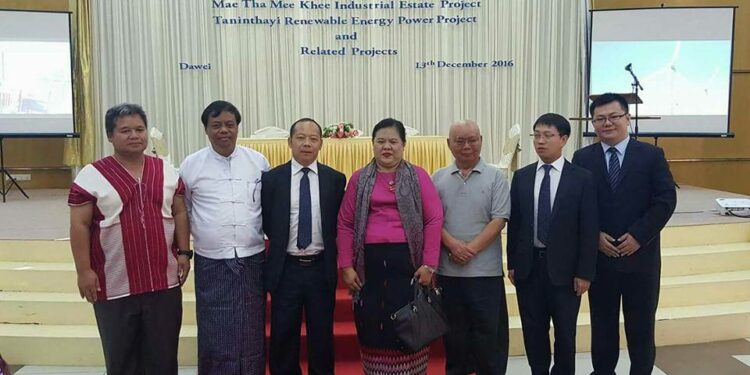CHIANG MAI, Thailand — Civil society organizations criticized the Karen National Union (KNU), Burma’s oldest ethnic armed organization, on Wednesday for its lack of transparency when signing a memorandum of understanding (MOU) with multiple trading companies.
At least 17 Karen civil society organizations released a joint statement condemning the MOU on Wednesday, and over 300 additional civil society groups endorsed it. They said that KNU chairman Saw Mutu Say Poe and other KNU leaders failed to inform Karen civilians of the signing of the MOU, which will allow several companies to build new development and business projects in Tenasserim Division in southern Burma.
On Tuesday, the KNU chairman and representatives of Burmese and Chinese companies attended a signing ceremony for the MOU which will cover two major projects—the Mae Tha Mee Khee industrial project and the Tanintharyi renewable energy project, which will construct a dam on the Tanintharyi River—and several smaller related projects, including a small port and new roads in Myeik and Dawei townships.
“We are greatly disappointed that the KNU chairman rushed to attend the signing ceremony, and we do not accept the MOU signed for these projects because the signing goes against the will of the Karen people,” read the statement released by the civil society organizations.
“Investment in large-scale infrastructure projects must not come before sustainable peace and political dialogue,” said the statement.
Companies that signed the MOU included Noble Prince Co., Sun and Rainbow Co., and Power China International Group. U Ngwe Soe, managing director at Sun and Rainbow Co., also attended the meeting.
Civil society organizations, however, said they were never informed about the industrial projects and expressed concern that these projects will cause more harm than good. The KNU and industrial companies also didn’t consult with the local Karen communities about the two major projects.
Other ongoing projects in Myeik and Dawei townships have drawn recent complaints too. Local Karen communities are concerned about the negative impacts from a palm oil project at Myanmar Stark Prestige Plantation (MSPP) and from the Ban Chaung coal mine.
Although KNU chairman Saw Mutu Say Poe attended the MOU signing, not all of the KNU central committee members were aware of the MOU, and it remains unclear what the KNU’s involvement is with these projects.
KNU vice-chairperson Naw Zipporah Sein told The Irrawaddy that she and other leaders don’t know anything about the MOU.
“We were not aware of it,” she said. “We never talked about the KNU signing an MOU with those companies. I don’t know what business and development they are going to carry out. Some concerned KNU leaders or leaders in Dawei Township may know more about the projects.”
Naw Zipporah Sein said the KNU leadership should have discussed the MOU and how it would benefit local Karen communities. She said the KNU economic committee also had not discussed the projects in Dawei Township.
“We don’t know how big or small the projects are,” said Naw Zipporah Sein. “And if they are producing energy, mega-projects, or mining, we don’t know how the energy will be delivered. We also don’t know if it will benefit local communities. We already decided in the past that these mega-projects should not be carried out before our political problems are resolved and before we establish a lasting peace.”
The 17 Karen civil society organizations also urged the KNU to listen to the Karen people and to not proceed with more business projects that will harm the environment or human rights.
One activist said the KNU chairman’s lack of transparency was undemocratic.
“The KNU are not acting in a way that is transparent and accountable to their own Karen people,” said Saw Alex Htoo, deputy director of the Karen Environmental and Social Action Network. “It is not a democratic act, what the KNU chairman is doing. How will these projects benefit the Karen people or the KNU as an organization?”
Saw Alex Htoo also opposed development projects in Karen State or other ethnic states which serve to strengthen centralized government over federal and decentralized structures.
The civil society organizations urged that new development projects in Tenasserim Division not move forward without a public consultation process that involves civil society groups and local communities.

















